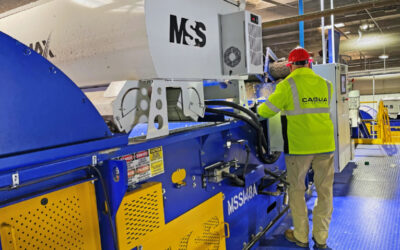Located a perfect distance between the major city centers in Wisconsin, up-and-coming Waushara County is one sweet destination for outdoorsy people looking to escape the city life.
Cities can feel like a necessary evil sometimes. Many of us find jobs and make money there, but with all the concrete and congestion, you can make a case for getting back to nature.
Walking along a trail left behind by glaciers or sitting by a quiet lake beats getting crammed into an underground subway. Robert Sivick, County Administrator at County of Waushara in central Wisconsin will tell you – life in the county is better!
“We have a number of lakes in the area – thank you, ice age. And we offer people from Milwaukee and Chicago, who are running the rat race every day, a way to decompress and get out of that for a weekend or a week or two. They can experience the calm so they can recharge the batteries,” Sivick says. He knows how therapeutic a nature walk with his dog, Buddy, can be. “It’s beautiful here.”
The county is located just far enough from major the population centers to offer the rural peace and quiet but at the same time, it’s not too far away. In fact, Waushara is about equal distance between Milwaukee, which is two hours southeast, Green Bay, one hour and a half northeast, and Madison, just an hour and 15 minutes directly south.
And because of its central location and easy access to outdoor pursuits, both tourists and seasonal residents are starting to make Waushara County a real destination.
“Many of our lakes are surrounded by large, expensive homes that tend to be owned by wealthy people from the Milwaukee and Chicago area. Our population effectively doubles to about 50,000 from May to October.”
And Sivick is devoted to developing and showcasing the county to people who haven’t experienced its charms. He’s a lawyer by profession who practiced in Nebraska. After Hurricane Katrina struck in 2005, he joined the Small Business Administration of Disaster Assistance in Fort Worth Texas that provided rehabilitation loans for natural disaster victims. Then he returned to Nebraska where he started working in county administration there and in Oregon.
All of these places had a rural feel similar to Waushara County, which is one of the reasons why he found the opportunity to come to Wisconsin so appealing. The county’s elected officials were also open to trying different things to develop Waushara.
“I took the job because of my experience in local government,” he says. “I’ve been here two years and can say that this group of elected officials is by far the best I have dealt with. They let me do what I need to do and we have had a great deal of success.”
As with many rural areas, there are challenges. In some ways, Waushara is a county of haves and have nots. The year-round population struggles financially with about 49% of the population either below the poverty line or classified as working poor. These are the people where an unexpected $500 expense could knock them out.
In contrast, the summer residents are made up of upper middle class. There are even a few who are in the 1%. Most of these summer residents come to Waushara from cities like Milwaukee and Chicago. And while they spend less time overall in the county, they pay a large amount of property tax for the county that supports services and programs for everyone.
When he talks about how the county is poised to grow, Sivick sees it as a three-legged stool. “It is based on agriculture, which is by far the largest, manufacturing, and tourism.” While agriculture has one of the oldest sources of employment in Waushara, today it is becoming increasingly automated, so no longer considered a source of employment growth. The same can be said for manufacturing, so there’s a need to promote the skills that companies are looking for – a developed workforce is a drawing card for manufacturers who are considering relocating their operations.
The county has connected the public schools to Fox Valley Technical College in neighboring Appleton. In fact, Wisconsin was the first state to issue a statewide technical vocation system. “In the fall of 2017, I met with people from the technical college and the schools in the county. We created a plan where the school district agreed to donate land on the high school campus and the county provided financial assistance for Fox Valley to build a branch campus in Wautoma, the county capital.”
Since opening, the program has seen a lot of success, offering people a chance to gain skills such as welding, commercial driving and nursing. One of the outcomes of this kind of program is that people are upskilled from stereotypical fast food jobs into opportunities to have higher paying jobs.
“The third leg of the stool is tourism and we’re well positioned for that,” Sivick says. “We have the lakes, streams and downhill ski area and hundreds of miles of snowmobile trails to round out the winter activities.”
The challenge is developing an identity to promote the area’s natural appeal and big blue skies. Sivick has taken a team approach, talking to neighboring counties to market central Wisconsin as a four-season getaway to different demographics.
While previous generations like the “louder” outdoor activities of turkey and deer hunting, millennials prefer more quiet activities like hiking and biking in nature – there’s so much of that here in a pristine setting with a back-to-the-land feel.
Waushara, for example, contains part of the Ice Age Trail, one of the few national trails in the U.S. and the only one contained in one state. The trail is over 1,000 miles long. Along the Waushara part, there are different community events including one for dog-walking and a romantic hike where the trail is lined with candles so couples can walk to a resort for dinner and drinks.
Intrigued? There’s much more to come!
And the people who are working hard to make it happen may not see their efforts bear fruit for many years. Sivick takes all this in stride. “I was raised to believe that life requires work and that you accomplish things and that you leave the place a little better then when you came there.”













